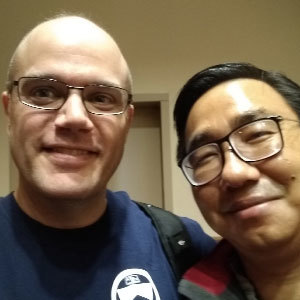Anam Cara Program Creates Spiritual and Practical Friendships
April 30, 2019 | Campus Life, Community, Public, Spiritual Life, Students

Before Seminary, MDiv senior Matt Enzler worked as a prosecutor in Washington state. The more he got involved at church, however, the more Enzler felt the pull of ministry. He decided to apply to Princeton Theological Seminary, his pastor’s alma mater.
“Coming back, particularly as a second career student, has some added challenges,” Enzler says. “I hadn’t been in school, at that point, for 10 years.”
Just down the hall from him lived Erik Khoobyarian, a returning student with whom Enzler had a surprising amount in common. “He’d also been an attorney for several years before coming here,” Enzler says. “He really just took me under his wing and helped me get situated and feel at home.”
Enzler and Khoobyarian were part of the Anam Cara ministry at Princeton Seminary, which pairs incoming students with a returning student. It is a voluntary program open to all new students.
“Anam Cara” is a Celtic phrase meaning “spiritual friendship,” popularized more recently by Celtic theologian and scholar John O’Donohue. “This is a spiritual and emotional resource for our new students,” says Jan Ammon, minister of the chapel. Students meet once a week for a meal and a time of prayer. They may also choose to have a devotional time, Ammon says.
The program’s initial time commitment is six weeks, but most Anam Cara pairs choose to continue meeting long after that.

Kelly Spencer moved in early for PTS’s Summer Language Program, so she had the option of being paired with an Anam Cara match who was also taking part in Summer Language, or waiting until fall semester. She chose to begin during the summer.
“I ended up being paired with Mary Morrow, who’s wonderful,” says Spencer, now an MDiv middler. “We both love sports, and she happened to live right next door to me in Brown Hall.”
She and Morrow decided to focus each week on a different liturgical prayer. “That was something I kind of understood but had never particularly done,” Spencer recalls. “We would grab a Book of Common Worship or a Book of Common Prayer and work through it as a way of being in prayer about my transition here.”
Lydia Tembo, now an MDiv senior, knew life as a full-time student at PTS would be a big transition. Before Seminary Tembo lived in Forest Hills, Queens in New York City, and worked a mental health clinic in Manhattan. Her Anam Cara partner, Barbara Florvil, helped her to connect with social groups on campus, including the Association of Black Seminarians (ABS), and a women’s fellowship within ABS. “She just showered me with prayer, showered me with information for how to survive your first year, thrive, even and flourish,” Tembo recalls. “We’re still in touch weekly.”
The summer after their respective first years, Ammon asked Tembo, Spencer, and Enzler to be a part of the small team that pairs incoming students with Anam Cara matches. She and the students look at a variety of different points of connection, including age, geographical location, denomination, career history, or family situation.
“Before we do anything, we pray. We pray for God to guide the matches. We pray for God’s wisdom and guidance, and that we’re faithful in the process,” Ammon says.
“This year, one Anam Cara match was two married students and they both had school-aged children,” she says. “The returning student was so helpful with the ins and outs of getting your kids launched in the school system here.”
Her second year, Tembo was paired with Donna Simmons, an incoming student who had also already begun her career before starting Seminary. “I was able to do what Barbara did for me for someone else,” she recalls. For her final year of Seminary, Tembo was excited to sign up for the program again. She says her Anam Cara, Desiree McCray, has blessed her life in many ways.
“When I saw Des before one of my ordination exams, she prayed over me,” Tembo recalls. “It meant a lot, because she knew where I’d been and she could recognize what I needed at that moment.”
Tembo sees the Anam Cara program as an important resource, especially for “international students or those who are from marginalized or less-represented populations in the student body.” ABS, she says, encourages all its members to sign up for the program, because they’ve experienced it to be so meaningful.
“Barbara, myself, Des, and Donna are all women of color,” she says. “Our experience on campus is quite different from the dominant student body. It’s been so helpful, as women of color, to be in fellowship together and help one another navigate this institution.”
Enzler, too, has returned to the Anam Cara program. He’s paired with Samuel Pachuau, a ThM student from Aizawl, India. Pachuau, a Presbyterian minister, attended India’s Aizawl Theological College. After finishing his degree here, he will return to his family in India and continue working as a pastor. Enzler says he’s learned much from Pachuau in their weekly meetings.
“He ministers to me just as much as I do to him.”





